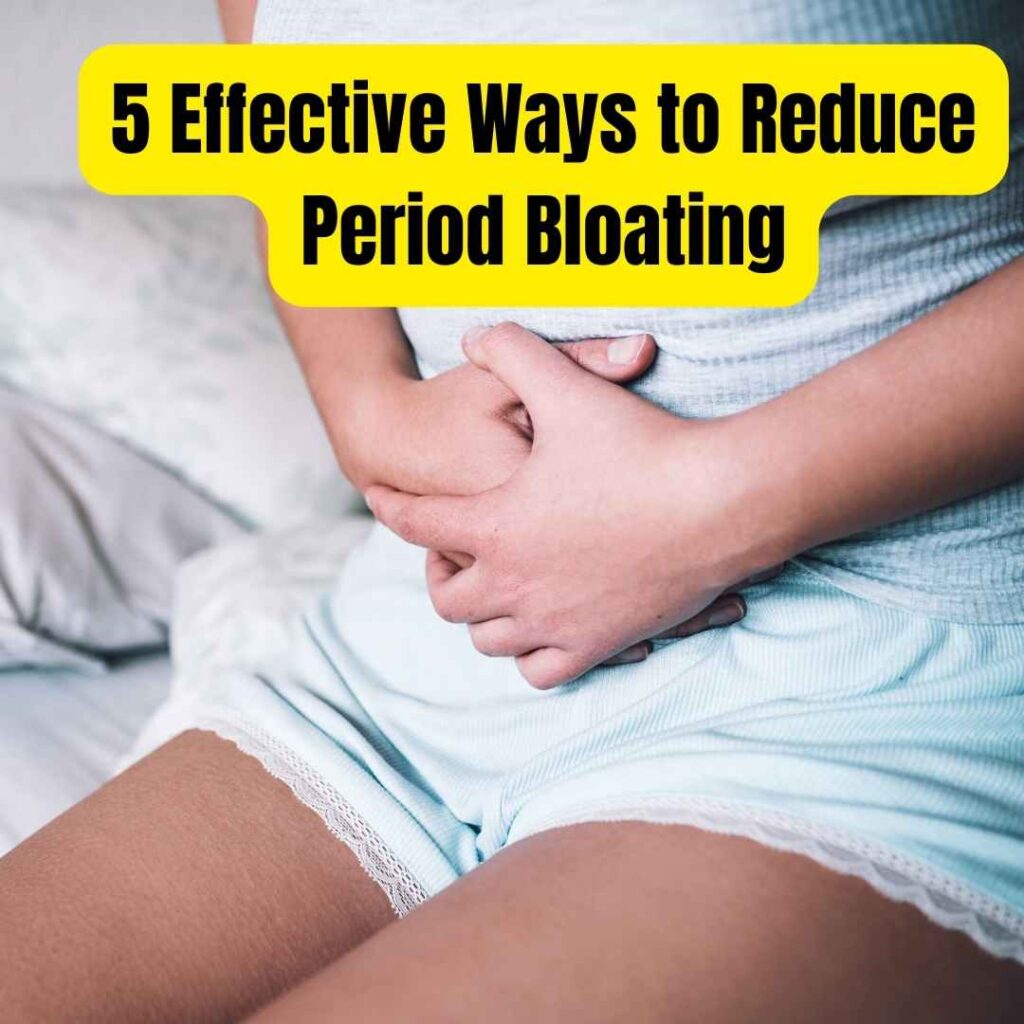5 Effective Ways to Reduce Period Bloating and Feel Lighter
Many women experience the discomfort of period bloating as part of their menstrual cycle. This bloating can make you feel heavy, puffy, and just generally uncomfortable. It’s a frustrating symptom, often affecting how clothes fit or even your mood. But what exactly is period bloating, why does it happen, and what can you do to manage it? In this guide, we’ll dive into everything you need to know about period bloating and provide five simple yet effective tips to help reduce it.
What is Period Bloating?
Period bloating refers to that heavy, swollen feeling many women experience before and during their period. It often starts a few days before menstruation and can last for the first few days of your cycle. For some, it’s mild, while for others, it can feel extremely uncomfortable and even painful. The primary reason for this bloating is the hormonal changes that occur during your menstrual cycle. These fluctuations can cause your body to retain water and gas, which leads to that bloated feeling.
When Does Period Bloating Occur?
Period bloating usually happens during the luteal phase, which is the time between ovulation and the start of your period. This is when the body’s production of the hormone progesterone increases. Bloating can start a few days before your period and may last until the first few days of your menstrual flow. For some women, bloating may subside as their period progresses, while for others, it may persist through their period’s duration.
This timing is key to understanding why bloating occurs at certain points in your cycle. As your body prepares for menstruation, it holds onto more water, which can lead to bloating, swollen legs or feet, and that general feeling of puffiness.
Why Do Periods Cause Bloating?
Periods cause bloating primarily because of changes in your hormone levels. Two hormones in particular—progesterone and estrogen—play significant roles. During your menstrual cycle, these hormones rise and fall, influencing various processes in your body.
Water retention: Estrogen can cause your body to retain more water, leading to bloating. Your body holds onto extra fluids to prepare for a potential pregnancy, even though menstruation is about to occur. This results in bloating around the abdomen, legs, and even your face.
Slower digestion: Progesterone slows down your digestive system in the days leading up to your period. This sluggish digestion can lead to gas buildup, constipation, and bloating.
These combined effects make period bloating a natural, though uncomfortable, part of your menstrual cycle.
5 Tips for Managing Period Bloating
While period bloating is common, there are steps you can take to manage it and ease the discomfort. Let’s explore five practical tips to help you reduce bloating during your period.
1. Stay Hydrated to Reduce Water Retention
Staying hydrated may seem counterintuitive when you’re bloated, but drinking more water helps to actually flush out excess sodium from your body, which can reduce bloating. When you’re dehydrated, your body retains more water to prevent further loss, so drinking plenty of water can reduce this retention.
- Aim for 8-10 glasses of water per day. Drinking water throughout the day ensures you stay hydrated and helps with the elimination of excess fluids.
- Opt for herbal teas like ginger or peppermint, which are known for their ability to reduce bloating and support digestion.
- Avoid sugary and carbonated beverages. These drinks can lead to more bloating, as the carbonation can trap gas in your stomach, making bloating worse.
Adding fresh lemon slices or cucumber to your water can add a refreshing flavor while providing mild detoxifying effects.
2. Reduce Salt Intake
One of the main causes of bloating is too much sodium in your diet. Salt causes your body to retain water, which leads to bloating. Reducing your salt intake, particularly in the days leading up to your period, can help minimize this effect.
- Cook meals at home using fresh ingredients. Processed and packaged foods tend to have high amounts of salt, so preparing your own meals allows you to control the amount of sodium.
- Check food labels. Even foods that don’t taste salty may have hidden sodium. Look for low-sodium options when purchasing groceries.
- Enhance flavor with herbs and spices rather than depending on salt. Fresh herbs like basil, cilantro, and parsley, along with spices like turmeric and cumin, can add flavor to your dishes without adding sodium.
3. Eat Smaller, More Frequent Meals
Eating large meals can overwhelm your digestive system, which can lead to more gas and bloating. Instead of having three big meals, try eating smaller, more frequent meals throughout the day. This helps keep your digestive system moving smoothly and reduces the chances of bloating.
- Snack on healthy, fiber-rich foods like fruits, vegetables, and whole grains, which promote digestion and prevent constipation—a common cause of bloating during your period.
- Chew your food slowly. Eating too quickly can cause you to swallow air, which contributes to gas buildup and bloating.
- Avoid overeating late at night, as digestion slows down when you sleep, making it more likely for food to sit in your stomach and cause bloating the next morning.
Eating smaller, well-balanced meals helps your body digest food more efficiently, preventing that overly full, bloated feeling.
4. Get Regular Exercise
Exercise is a powerful way to reduce bloating because it helps stimulate your digestive system, reducing water retention and improving circulation. Regular physical activity can relieve the uncomfortable bloated feeling you experience during your period.
- Light cardio exercises like walking, cycling, or swimming are gentle on your body and can help reduce bloating by encouraging blood circulation and digestion.
- Yoga is another great option, especially poses like the child’s pose or wind-relieving pose, which help release trapped gas and reduce bloating.
- Stretching and Pilates can also be beneficial for engaging your core muscles and relieving bloating.
Even a short, 30-minute exercise session each day can make a significant difference in how you feel during your period.
5. Manage Stress Levels
Stress has a direct impact on your body, and it can make period symptoms, including bloating, worse. When you’re stressed, your body produces more cortisol, a hormone that increases water retention and affects digestion, both of which contribute to bloating.
- Practice relaxation techniques like deep breathing, meditation, or yoga to calm your mind and reduce bloating.
- Get plenty of sleep. Lack of sleep can increase your stress levels, so aim for 7-8 hours of quality sleep each night to help your body recover and reduce bloating.
- Engage in stress-reducing activities like reading, listening to music, or spending time with loved ones to keep your mind relaxed.
Managing stress can greatly reduce the intensity of bloating and other period symptoms.
When Should You See a Doctor?
While period bloating is generally normal, there are times when you should consider seeing a doctor. If bloating becomes severe or is accompanied by other worrying symptoms, it could signal an underlying issue.
See a doctor if:
- Bloating is accompanied by severe abdominal pain or lasts more than a week.
- You experience bloating outside of your period regularly.
- There are other symptoms like unexplained weight gain, vomiting, or changes in bowel habits.
- Your period becomes irregular or unusually heavy, along with bloating.
Conditions like endometriosis, irritable bowel syndrome (IBS), or ovarian cysts may contribute to abnormal bloating and should be checked by a healthcare professional.
Final Words
Period bloating can be an uncomfortable and frustrating symptom of menstruation, but with a few simple lifestyle adjustments, it’s possible to manage and reduce the bloating. By staying hydrated, reducing salt, eating smaller meals, exercising regularly, and managing stress, you can take control of bloating and feel more comfortable during your period. Remember, if your bloating is severe or unusual, it’s always a good idea to seek medical advice to rule out any underlying health issues
For more tips and advice on managing period symptoms and women’s health, follow us.
Disclaimer: The tips provided here are for informational purposes only and are not a substitute for professional medical advice. Always consult your doctor before making changes to your health routine or if you experience severe symptoms. Avoid self-treatment, especially if your bloating is persistent or accompanied by other concerning symptoms.

